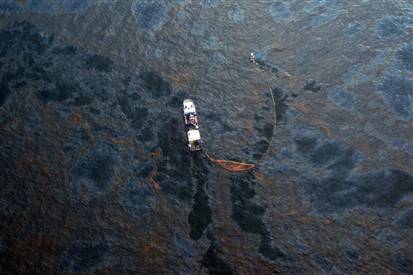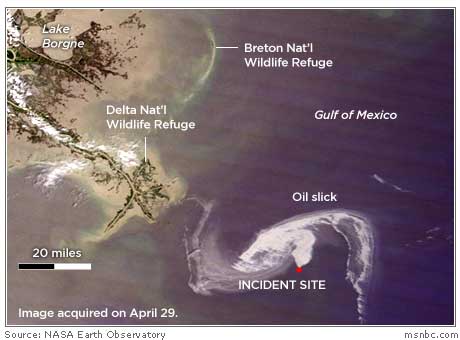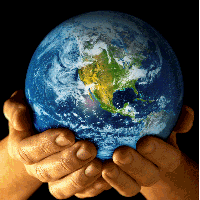 I
promise this article is not filled with sentimental hippy-dippy
syrup. I am not one to bow down to "Mother Earth" and frolic
about singing songs to the trees, but the recent oil spill in the
Gulf of Mexico has left me in mourning. Obama has referred to it as a
"potentially unprecedented environmental disaster." Is it really
just a terrible environmental disaster, though? This is not like the
eruption of Mt. St. Helen in the 80s, this is not a hurricane or some
other natural phenomena. This is a high-stakes human blunder --
collateral damage in the battle for big profit.
I
promise this article is not filled with sentimental hippy-dippy
syrup. I am not one to bow down to "Mother Earth" and frolic
about singing songs to the trees, but the recent oil spill in the
Gulf of Mexico has left me in mourning. Obama has referred to it as a
"potentially unprecedented environmental disaster." Is it really
just a terrible environmental disaster, though? This is not like the
eruption of Mt. St. Helen in the 80s, this is not a hurricane or some
other natural phenomena. This is a high-stakes human blunder --
collateral damage in the battle for big profit.
As 5,000 gallons of oil have been filling the majestic blue ocean off our gulf coast for over a month, I am painfully reminded of how hard it is for mankind to understand the delicate balance between the high and low office we have inherited as stewards of God's creation.
On the one hand, our Lord set us over creation (Gen. 1:28). As the only creatures that bear his image, we have been given the privilege of making beautiful and creative use of creation and classifying his creatures, discerning both their place and ours within the world. The scientific method has revealed the splendor of this vocation for thousands of years.
On
the other hand, Russell D. Moore of Christianity Today makes a
good point about an indisputable interdependence. This "image-bearing
dominion...isn't a pharaoh-like dominion; it is a Christ-like
dominion. Humans aren't made of ether; we're mad e of spirit
enlivened mud. We come from the earth, and we must receive from
nature what we need to survive in the form of light from the sun,
oxygen from plants, and food from the ground."
e of spirit
enlivened mud. We come from the earth, and we must receive from
nature what we need to survive in the form of light from the sun,
oxygen from plants, and food from the ground."
In other words,we are creatures set to have dominion over a creation from which we were formed and upon which we are desperately dependent.
It is a high office, in that we are - in a sense - little rulers and creators in the image of our God, but low, in that we are most certainly not gods ourselves. Forgetting the latter half of this design has been the source of so much of the hubris, oppression and poisonous opportunism that has characterized the ebb and flow of human civilizations over the ages. This monstrous oil spill is a perfect micro-illustration of this imbalance.
The
oil drilling that was going on off our coasts is nothing short of
amazing. Humans have invested billions upon billions of dollars worth
of time, technology, research and creativity into developing these
rigs. There are a wide v ariety: semi-submersible, jack up platforms,
compliant towers, drill-ships, etc. It is nothing short of amazing
that humans have the ability to locate and extract oil from wells
created miles below the surface of the sea, and off-shore drilling is
incredibly valuable to our fight to become less dependent on foreign
oil. But not even a fraction of these resources and creativity have
been put into learning how to clean up or prevent the tragedy that is
upon us. This can only be reasonably understood as a symptom of
ignorant pride.
ariety: semi-submersible, jack up platforms,
compliant towers, drill-ships, etc. It is nothing short of amazing
that humans have the ability to locate and extract oil from wells
created miles below the surface of the sea, and off-shore drilling is
incredibly valuable to our fight to become less dependent on foreign
oil. But not even a fraction of these resources and creativity have
been put into learning how to clean up or prevent the tragedy that is
upon us. This can only be reasonably understood as a symptom of
ignorant pride.
Let me not be too hard on BP. I am looking at this whole scenario with hindsight-bias. Now that these events have occurred, it seems as though they were inevitable. To be fair, I don't think anyone could have conceived this magnitude of a spill and some BP representatives may feel very remorseful over this tragedy, but there is an important lesson here. We need to be as concerned about preserving and protecting our world as we are about making opportunistic use of it. More often than not we have looked at our world, not as the wonderful creation from which we were created, but as a subservient slave to be used as a means to our own personal ends.
Discerning
our relationship to the world is not easy. Many of us have been
brought up in the throes of capitalism where creative industrial use
of the world's resources is of the highest value. The technological
shifts of the Industrial Revolution gave us the ability to harness
the power of natural resources in new ways. And with it, came the
temptation to overestimate that power and to hold nature ransom with
it. Native and aborigina l peoples have managed to live well off of
the natural rhythms of land, bestowing upon the land protective
rights and refusing to violate those rights. Still, these groups'
respect for the land (as with that of some contemporary
environmentalist movements) tends to stem from the deification of the
earth, which just leads to further misunderstandings of humanity's
place within it. God, in his infinite wisdom, provides us with an
example of the balance between these two polarized perspectives.
l peoples have managed to live well off of
the natural rhythms of land, bestowing upon the land protective
rights and refusing to violate those rights. Still, these groups'
respect for the land (as with that of some contemporary
environmentalist movements) tends to stem from the deification of the
earth, which just leads to further misunderstandings of humanity's
place within it. God, in his infinite wisdom, provides us with an
example of the balance between these two polarized perspectives.
God gave man the concept of Sabbath rest for the glory of his name and for the rest and preservation of his people. This was to help man remember that God is a faithful provider, and that it is not necessary for his people to anxiously work everyday of their short lives. In turn, man was to extend Sabbath rest to the land, working it for six years, and then giving it one year of rest (Leviticus 25:2-7). While the Israelites failed to uphold this law, it would have helped them to remember that the land was a creation of God, and that as God's chosen people, they were uniquely equipped to treat it as such. It would surely have filled them with deep joy, to have anxiously returned to the fields after the year's rest and to see it respond vibrantly--bearing fruit in fresh and abundant praise.
Finding
this balance is not easy and surely requires the counsel of the Holy
Spirit. But we must remember that caring for this world is a valid
and essential part of what it means to be human. It is a God-endowed
vocation, and Christians need to be willing to set an example, and
when possible, to pick up the slack where ever companies like BP Oil
drop the ball.
 K.
Swann is a singer-songwriter in New York City with cutting edge
thoughts on life, art and spirituality. He is currently studying
Biblical Studies and Theology at Nyack College.
K.
Swann is a singer-songwriter in New York City with cutting edge
thoughts on life, art and spirituality. He is currently studying
Biblical Studies and Theology at Nyack College.

